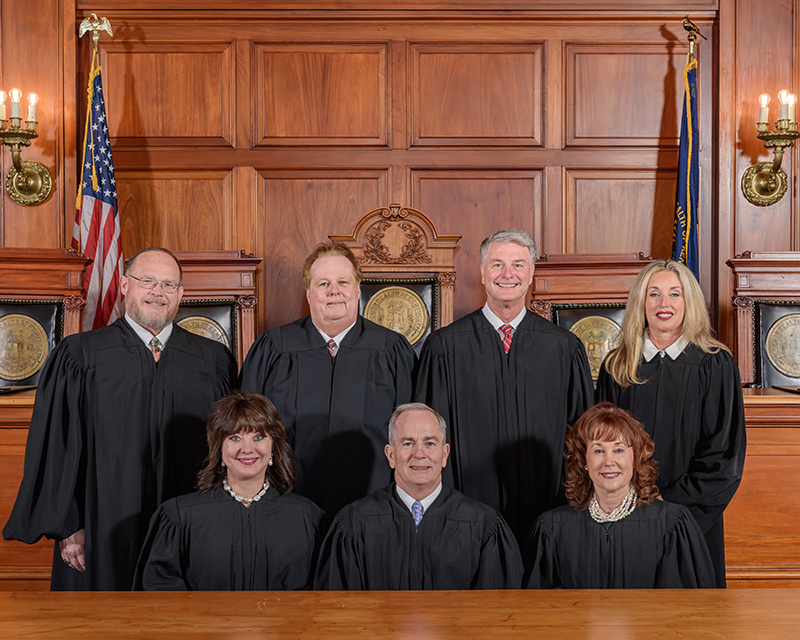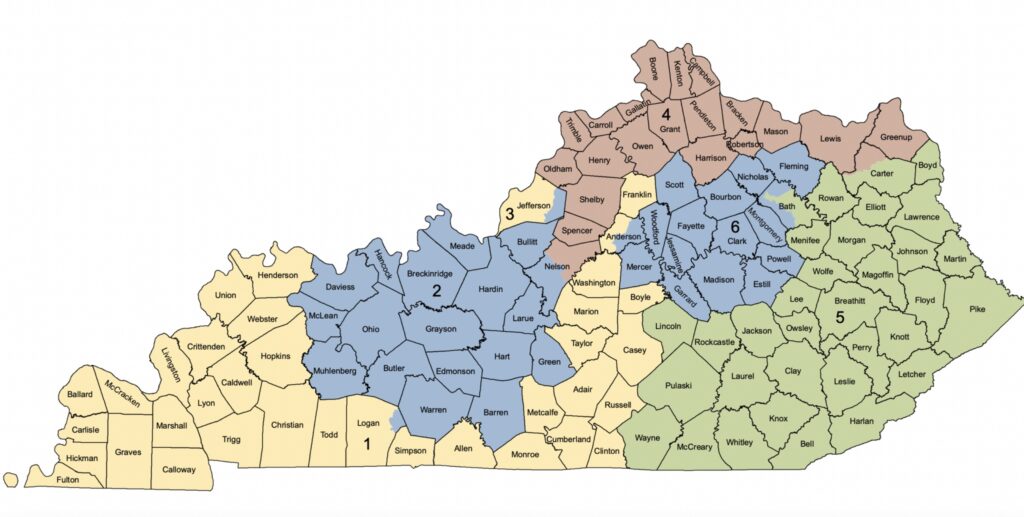Kentucky’s recently redrawn congressional and legislative districts will stand for future elections.
In an opinion published Thursday morning, the Kentucky Supreme Court affirmed Franklin Circuit Judge Thomas Wingate’s previous decision that the maps were a result of “partisan gerrymanders” but did not find them unconstitutional.
“Regardless of how unusual or eye-raising it may be, we must not erase it unless it plainly leaves the four corners of our constitutional frame,” the opinion, written by Justice Angela McCormick Bisig, says. “In applying the substantially deferential standard we afford to purely political acts by a coordinate branch of government, we perceive no such constitutional infirmity and thus affirm the trial court’s conclusion that the redistricting statutes pass constitutional muster.”

Justices heard oral arguments in the case in September. At the time, Michael Abate, a Louisville attorney representing Democrats, told reporters the court will have to decide if the state Constitution prohibits a majority party from gerrymandering or creating districts to heavily favor the party in power. He said elections with preordained outcomes because of gerrymandering are “not ‘free or equal,’” as the state Constitution requires.
However, Republican Secretary of State Michael Adams, a defendant in the lawsuit, said after oral arguments the case hinges on what is in the state Constitution regarding gerrymandering, not just the new maps.
“Our position is that the Constitution doesn’t speak to this issue at all. If it did, why’d the Democrats gerrymander their maps for 100 years?” Adams said. “So my view is this is a matter in the Constitution left up to the legislature, and they can use their own standards as long as they comply with the Voting Rights Act.”
In response to Thursday’s ruling, Adams said in a statement [he] was “pleased” that the Court “overwhelmingly rejected the Kentucky Democratic Party’s reckless, frivolous and hypocritical lawsuit that sought to impose a different set of election rules through the courts, following Democrats’ loss of legislative control that they had previously won for decades under those very rules.”
The Republican Party of Kentucky also applauded the decision.
“The highest court in Kentucky has rejected a pathetic attempt by the Democrats to throw out Kentucky’s congressional and state house district maps,” RPK spokesman Sean Southard said. “The Court rightfully rejected the Democrat effort to manipulate the political process and sue their way into the Congress and the state house.”
Kentucky House Democrats said the Supreme Court had upheld “textbook examples of extreme partisan gerrymandering.”
House Democratic leaders Reps. Derrick Graham, Cherlynn Stevenson and Rachel Roberts issued this statement: “It has often been said that voters should be the ones who choose their leaders, not the other way around. We still believe in that, which is why we firmly disagree with today’s Kentucky Supreme Court decision. It gives legislative majorities much more authority to protect themselves at the expense of many voters while guaranteeing more political polarization for decades to come.
“The current congressional and state House maps are textbook examples of extreme partisan gerrymandering, from how they were drawn in secret to how they effectively decided the outcome of most races by the end of the primary. This entire process should have been rejected today; instead, we fear it will now become standard procedure,” the Democrats said.
The Kentucky Democratic Party also expressed disappointment with the ruling.
“Today’s ruling reversing the lower court’s finding that these maps are extreme partisan gerrymanders — while deeply disappointing — will be an important bulwark against future efforts to draw more extreme partisan gerrymandered maps in Kentucky,” Kentucky Democratic Party Chair Colmon Elridge said in a statement. “The Republican majority worked behind closed doors to draw districts that cut up communities for partisan gain to beat incumbents they couldn’t beat on a fair playing field. Frankfort politicians should not decide who they represent, and Republicans will only grow bolder in coming decades if we don’t put a stop to the GOP majority. Kentucky’s future is on the line and the KDP intends to fight for it.”
In his weekly press conference, Democratic Gov. Andy Beshear called for a constitutional amendment, though noted it would be difficult to pass in the General Assembly.

Justice Christopher Shea Nickell, concurring with the majority opinion in part while also dissenting in part, wrote “ any comprehensive remedy for the deleterious effects of partisan gerrymandering must be addressed through the political process.”
“Should the people discern egregious, arrogant political abuse upon review of the legislative redistricting plans enacted by their elected representatives in the General Assembly, their ultimate remedy lies in a constitutional amendment or expulsion of the perpetrators at the polls,” Nickell said. “In short, review and remedy of controversies related to political gerrymandering reside with the people.”
Justice Robert B. Conley, in dissent, wrote he agreed with much of the court’s analysis but disagreed that Democrats “had standing to bring such claims in the first place.”
This article is republished under a Creative Commons license from Kentucky Lantern, which is part of States Newsroom, a network of news bureaus supported by grants and a coalition of donors as a 501c(3) public charity. Kentucky Lantern maintains editorial independence. Contact Editor Jamie Lucke for questions: info@kentuckylantern.com. Follow Kentucky Lantern on Facebook and Twitter.






